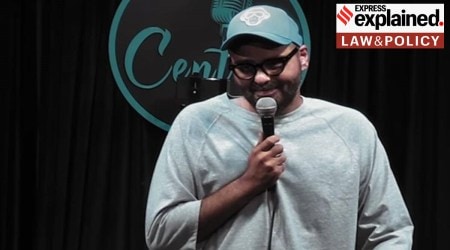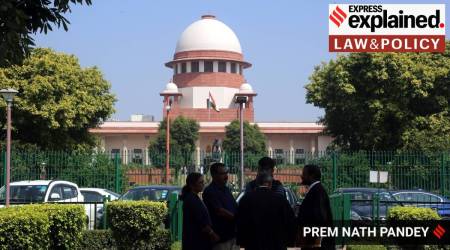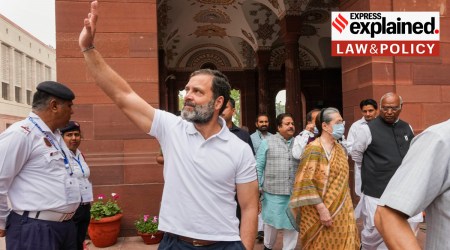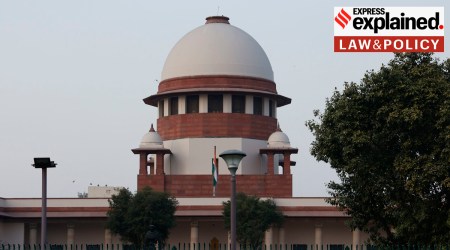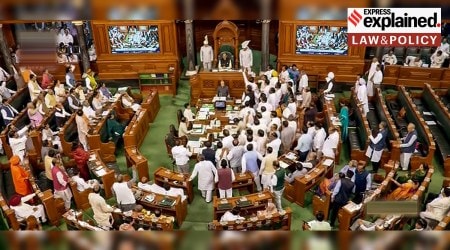EXPLAINED LAW NEWS - Page 27
Why has Kunal Kamra gone to Bombay HC against the government’s proposed ‘fact checking unit’ for social media content?Subscriber Only
According to the new IT rules, any online content that the ministry-appointed fact-checking body marks as “fake or misleading” will have to be taken down by online intermediaries if they wish to retain legal immunity against third-party content.
How Tamil Nadu and the Centre have locked horns over the issue of online gamingSubscriber Only
The state’s assembly had passed the Tamil Nadu Prohibition of Online Gambling and Regulation of Online Games Ordinance, 2022 last October. However, in early March, the Governor RN Ravi had returned the ordinance for reconsideration.
What is the SC’s public interest immunity claim procedure?Subscriber Only
In the MediaOne judgment, the top court devised a procedure to balance the principles of justice with non-disclosure of information on grounds of national security
Netflix sent a notice regarding The Big Bang Theory’s derogatory reference to Madhuri Dixit: What is a legal notice?Subscriber Only
As per the legal notice, OTT platform Netflix has been asked to remove the first episode of season two where the character of Raj allegedly refers to Madhuri Dixit using a "derogatory term".
Rahul Gandhi appeals defamation conviction: Here is what he has arguedSubscriber Only
Rahul Gandhi's appeal has called the sentence 'harsh and highly excessive', arguing that it was pronounced in 'hot haste'. Here is what the appeal says.
‘Natural Justice’ and ‘Proportionality’: Why Supreme Court ruled in Media One’s favourSubscriber Only
The MHA had cited alleged links between the channel’s promoters Madhyamam Broadcasting Limited and Jamaat-e-Islami Hind for denying the security clearance to Media One. Following this, the channel was taken off the air
MediaOne: What Supreme Court said on freedom, national securitySubscriber Only
In quashing ban on TV channel, apex court makes key observations on role of the press in a democracy, and underlines principles of natural and open justice.
SC directs Media One’s licence to be renewed: What is the case?Subscriber Only
The apex court also criticised the 'sealed cover procedure' adopted and the 'cavalier manner' in which the Centre 'raised the claim of national security'.
What the SC said on bail after ‘undue delay’ in trials, even for stringent laws such as NDPSSubscriber Only
In the current ruling, the court also spoke of the dangers of “unjust imprisonment” which puts the inmates at risk of “prisonisation,” a “radical transformation” by which a prisoner loses his identity.
Anushka Sharma’s plea on sales tax disposed of by Bombay High Court: What was the case?Subscriber Only
Anushka Sharma claimed that the authority had "erroneously" noted that she had acquired "copyright" through endorsements and by anchoring award functions, and had sold or transferred it.
Query on PM’s education: How the case moved from CIC to Gujarat HCSubscriber Only
The case originates from a hearing of Kejriwal’s second appeal before the CIC in a case relating to the supply of information about his Electoral Photo Identity Card (EPIC).
Competition (Amendment) Bill passed in Lok Sabha: How it affects Big TechSubscriber Only
One of the major changes in the amended law is that it affords the Competition Commission of India (CCI) the ability to penalise entities found engaging in anti-competitive behaviour based on their global turnover.
All acquitted in 2008 Jaipur terror blasts: Why the HC rejected police’s ‘shoddy’ and ‘botched’ probeSubscriber Only
Following the judgment, even 15 years after the blast, which resulted in the deaths of 80 people and injured 185 others, no person now stands convicted of the crime. Here's why.
Lahore High Court strikes down Pakistan’s ‘sedition law’: The law, the case and India parallelsSubscriber Only
A product of India and Pakistan's colonial rule, the 'sedition law' has always been contentious on account of how it can be used to curb dissent.
Arif and his Sarus crane: What law is he booked under, what penalty he facesSubscriber Only
The WPA aims to conserve protected species of birds, animals, and some plants in two main ways: by prohibiting the hunting of all protected species and protecting their habitat through sanctuaries, national parks, reserves, etc.
Why Lakshadweep MP Mohammed Faizal has challenged his disqualification in the Supreme CourtSubscriber Only
On January 13, the Lok Sabha Secretariat notified Faizal's disqualification under Section 8(3) of The Representation of the People Act, 1951. This is the same section under which Rahul Gandhi was disqualified in a defamation case.
Rahul Gandhi faces another defamation case. What is the 2016 complaint about?Subscriber Only
Rahul Gandhi was sentenced to two years in jail recently by a Surat Court in a defamation case. Another defamation proceeding is on against him. Here's what that case is about.
Rahul Gandhi disqualified as MP: Here are the perks and benefits he is set to loseSubscriber Only
Sitting Members of Parliament enjoy a variety of amenities, from free phone calls to travel allowances.
Rahul Gandhi disqualified: What this means, what happens next?Subscriber Only
Wayanad MP Rahul Gandhi has lost his Lok Sabha seat after being convicted of criminal defamation by a Surat court. What happens now — and what are the best- and worst-case scenarios for him?
What are the laws under which Rahul Gandhi has been disqualified?Subscriber Only
The notice issued by the Lok Sabha Secretariat disqualifying Rahul Gandhi mentions Article 102(1)(e) of the Indian Constitution and the Representation of People Act, 1951.
SC rules mere membership of banned org enough to mean offence: What the new ruling saysSubscriber Only
The latest ruling lowers the bar for who can be charged under the stringent anti-terror law.
Rahul Gandhi disqualified as Lok Sabha MP after conviction: How the process worksSubscriber Only
Rahul Gandhi's disqualification comes a day after he was sentenced to two years in jail in a defamation case, triggering the process of his disqualification as an MP. What exactly does the law say, and what are Gandhi's options?
What is the Lily Thomas SC verdict, which affects Rahul Gandhi’s disqualification caseSubscriber Only
The Supreme Court struck down as 'unconstitutional' a key provision in the law in its landmark 2013 'Lily Thomas v Union of India’ ruling. This will now impact Rahul Gandhi's case. Here is what that verdict was.
What does ‘guillotine’ refer to in legislative parlance?Subscriber Only
What is the parliamentary procedure of 'guillotine'? Where does the word come from?
Rahul Gandhi has been convicted, but what happens to his MP status? Here’s what the law saysSubscriber Only
With Rahul Gandhi's conviction, his status as a Member of Parliament has come under the spotlight. Can he be disqualified? Here is what the law says.
30-second Reads
BEST OF EXPRESS





Must Read


Buzzing Now



